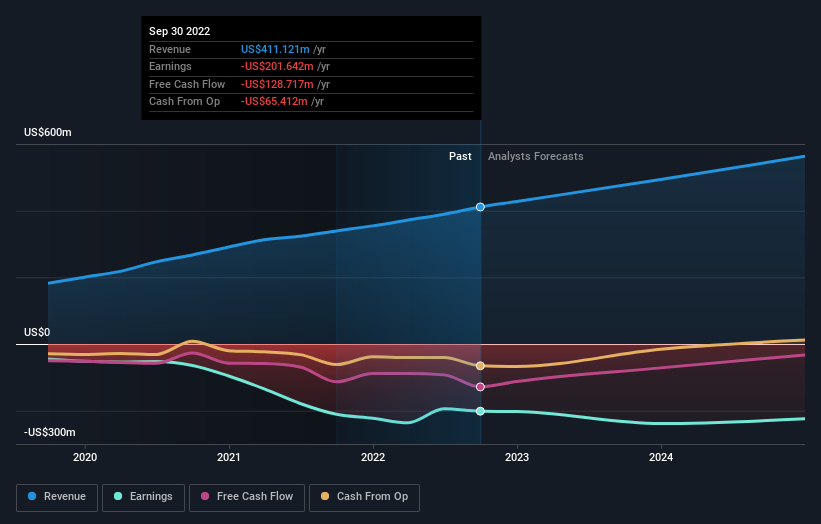In the wake of Fastly, Inc.’s (NYSE:FSLY) latest US$63m market cap drop, institutional owners may be forced to take severe actions

Key Insights
- Significantly high institutional ownership implies Fastly’s stock prices are sensitive to their trading actions.
- The top 13 shareholders own 51% of the company
- Insiders have been selling lately
Every investor in Fastly, Inc. (NYSE:FSLY) should be aware of the most powerful shareholder groups. The group holding the most number of shares in the company, around 63% to be precise, is institutions. Put another way, the group faces the maximum upside potential (or downside risk).
And so it follows that institutional investors was the group most impacted after the company’s market cap fell to US$1.1b last week after a 5.5% drop in the share price. Needless to say, the recent loss which further adds to the one-year loss to shareholders of 78% might not go down well especially with this category of shareholders. Often called “market makers”, institutions wield significant power in influencing the price dynamics of any stock. Hence, if weakness in Fastly’s share price continues, institutional investors may feel compelled to sell the stock, which might not be ideal for individual investors.
Let’s delve deeper into each type of owner of Fastly, beginning with the chart below.
View our latest analysis for Fastly

What Does The Institutional Ownership Tell Us About Fastly?
Institutions typically measure themselves against a benchmark when reporting to their own investors, so they often become more enthusiastic about a stock once it’s included in a major index. We would expect most companies to have some institutions on the register, especially if they are growing.
We can see that Fastly does have institutional investors; and they hold a good portion of the company’s stock. This suggests some credibility amongst professional investors. But we can’t rely on that fact alone since institutions make bad investments sometimes, just like everyone does. When multiple institutions own a stock, there’s always a risk that they are in a ‘crowded trade’. When such a trade goes wrong, multiple parties may compete to sell stock fast. This risk is higher in a company without a history of growth. You can see Fastly’s historic earnings and revenue below, but keep in mind there’s always more to the story.

Investors should note that institutions actually own more than half the company, so they can collectively wield significant power. We note that hedge funds don’t have a meaningful investment in Fastly. The Vanguard Group, Inc. is currently the company’s largest shareholder with 9.0% of shares outstanding. First Trust Advisors LP is the second largest shareholder owning 8.2% of common stock, and BlackRock, Inc. holds about 7.5% of the company stock. Furthermore, CEO Todd Nightingale is the owner of 1.0% of the company’s shares.
A closer look at our ownership figures suggests that the top 13 shareholders have a combined ownership of 51% implying that no single shareholder has a majority.
While studying institutional ownership for a company can add value to your research, it is also a good practice to research analyst recommendations to get a deeper understand of a stock’s expected performance. There are a reasonable number of analysts covering the stock, so it might be useful to find out their aggregate view on the future.
Insider Ownership Of Fastly
The definition of company insiders can be subjective and does vary between jurisdictions. Our data reflects individual insiders, capturing board members at the very least. Management ultimately answers to the board. However, it is not uncommon for managers to be executive board members, especially if they are a founder or the CEO.
Insider ownership is positive when it signals leadership are thinking like the true owners of the company. However, high insider ownership can also give immense power to a small group within the company. This can be negative in some circumstances.
Shareholders would probably be interested to learn that insiders own shares in Fastly, Inc.. This is a big company, so it is good to see this level of alignment. Insiders own US$103m worth of shares (at current prices). Most would say this shows alignment of interests between shareholders and the board. Still, it might be worth checking if those insiders have been selling.
General Public Ownership
The general public– including retail investors — own 28% stake in the company, and hence can’t easily be ignored. While this group can’t necessarily call the shots, it can certainly have a real influence on how the company is run.
Next Steps:
It’s always worth thinking about the different groups who own shares in a company. But to understand Fastly better, we need to consider many other factors. Consider for instance, the ever-present spectre of investment risk. We’ve identified 4 warning signs with Fastly , and understanding them should be part of your investment process.
Ultimately the future is most important. You can access this free report on analyst forecasts for the company.
NB: Figures in this article are calculated using data from the last twelve months, which refer to the 12-month period ending on the last date of the month the financial statement is dated. This may not be consistent with full year annual report figures.
Valuation is complex, but we’re helping make it simple.
Find out whether Fastly is potentially over or undervalued by checking out our comprehensive analysis, which includes fair value estimates, risks and warnings, dividends, insider transactions and financial health.
Have feedback on this article? Concerned about the content? Get in touch with us directly. Alternatively, email editorial-team (at) simplywallst.com.
This article by Simply Wall St is general in nature. We provide commentary based on historical data and analyst forecasts only using an unbiased methodology and our articles are not intended to be financial advice. It does not constitute a recommendation to buy or sell any stock, and does not take account of your objectives, or your financial situation. We aim to bring you long-term focused analysis driven by fundamental data. Note that our analysis may not factor in the latest price-sensitive company announcements or qualitative material. Simply Wall St has no position in any stocks mentioned.






